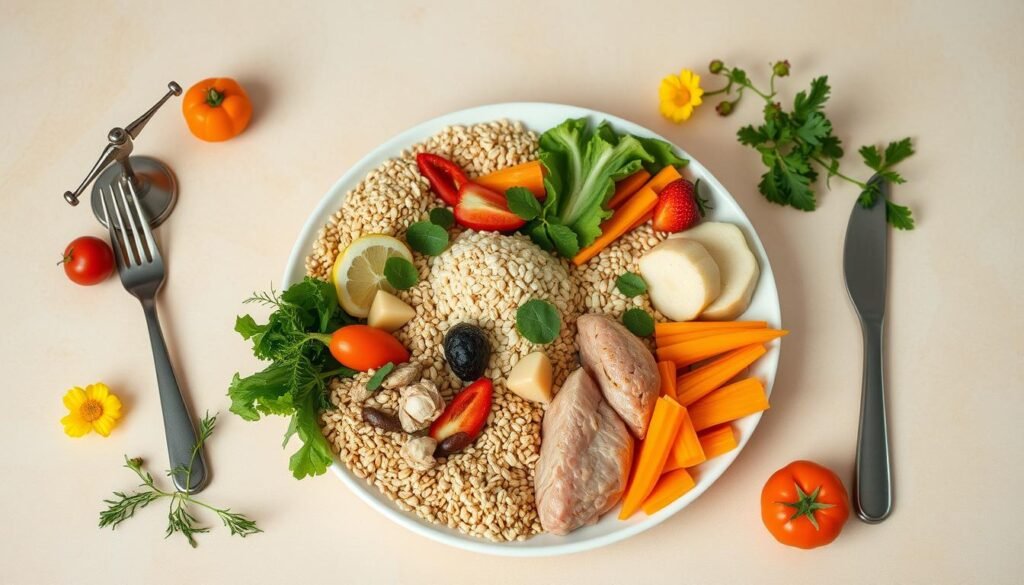Did you know up to 75% of women with Polycystic Ovary Syndrome (PCOS) have insulin resistance? This insight highlights the challenges they face in weight and symptom management. For these individuals, knowing about macronutrients is crucial for managing PCOS effectively. Adjusting the intake of carbs, proteins, and fats helps improve metabolism and reproductive health.
Research suggests that a diet tailored in macronutrients helps ease PCOS symptoms and balance hormones. A diet that aligns every part can boost insulin sensitivity, a key aspect of PCOS care. Adding strategies like monitoring macronutrient ratios aids individuals in customizing their diets. For more information, here’s an insightful guide on weight management with PCOS.
Key Takeaways
- Balancing macronutrients is crucial for effective weight management in women with PCOS.
- Protein should comprise about 30% of daily caloric intake to optimize PCOS management.
- Approximately 40% of calories should be derived from carbohydrates to combat insulin resistance.
- Fat intake should aim for 30-35% of daily consumption, supporting hormonal balance.
- Tracking macronutrient ratios can tailor dietary approaches for individual needs.
- Incorporating anti-inflammatory foods is essential for symptom relief and overall health.
Understanding PCOS and Its Impact on Weight
Polycystic ovary syndrome (PCOS) is common among women during their fertile years. It can cause a big hormonal imbalance, messing with the body’s system. A huge issue for women with PCOS is gaining weight. Many women, about 35% to 80%, deal with insulin resistance because of PCOS. This problem makes it easier to gain weight and harder to lose it.
Being overweight makes managing PCOS much harder. It also increases the chance of getting severe conditions like type 2 diabetes and heart disease. Too much body fat changes how certain important body signals are released. This causes ongoing, low-level inflammation that makes the hormonal imbalance even worse.
To really understand PCOS, you have to know about the metabolic and hormonal problems it causes. Women with PCOS often have issues with certain hormone levels and insulin resistance. Losing just a little weight, even just 5% to 10%, can greatly improve health. Eating the right foods is a powerful way to manage weight with PCOS.
Changing what you eat can help manage weight. Diets with lots of fiber, for example, may help reduce insulin resistance. This could mean less belly fat. Research shared by the National Institutes of Health shows how important diet is for managing PCOS.
Making smart food choices and focusing on nutrition are key for people with PCOS. Keeping an eye on weight is vital. It helps with symptom management and improves overall health.
Importance of Macronutrients in a PCOS Diet
Understanding macronutrients helps manage PCOS symptoms better. A good PCOS diet focuses on the balance of proteins, fats, and carbs. This balance aids in weight loss and boosts overall health.
Studies show a certain macronutrient mix can greatly improve PCOS management. Experts recommend 15-35% protein, 30-45% healthy fats, and 25-45% carbs. This mix helps keep insulin levels in check, which is vital for those with PCOS.
Diets high in protein and healthy fats work well for many women with PCOS. They help in maintaining a healthy weight and in keeping muscles strong which is good for metabolism. Lower carb intake has also been linked to better PCOS symptom management.
- High-fiber fruits and vegetables
- Lean proteins like chicken, turkey, and fish
- Healthy fats from avocados, nuts, and olive oil
- Whole grains like quinoa and brown rice
Improving macronutrient balance can lead to major benefits. Even losing 5% to 10% of weight can help with symptoms like irregular periods. Fine-tuning a PCOS diet aids effective weight loss, hormonal balance, and general well-being.
| Macronutrient | Recommended Ratio for PCOS Management | Example Daily Intake (based on 2,000 calories) |
|---|---|---|
| Protein | 15-35% | 100g |
| Fat | 30-45% | 133g |
| Carbohydrates | 25-45% | 100g |
This careful dietary planning is key for women with PCOS. It aims not just at managing the condition but also at improving life quality through smart eating.
Balancing Macronutrients for Weight Management in PCOS
Balancing macronutrients is key for women with PCOS who want to manage their weight. It’s important to have a diet plan that’s made just for you, as everyone’s body reacts differently. Focusing on proteins, healthy fats, and the right carbs can improve PCOS symptoms.
Small weight loss, around 5-10%, can make a big difference. It can bring back regular ovulation and fix hormone levels in women with obesity and PCOS. A diet with the right mix of macronutrients helps lose weight. This is vital for better reproductive health and overall happiness.
The Mediterranean and DASH diets help with weight and hormones. They are good for losing weight and controlling blood sugar and belly fat. These diets, rich in essential nutrients, also tackle vitamin D and omega-3 shortfalls in women with PCOS.
How you portion and time your meals also matters in PCOS management. Smaller, frequent meals help keep blood sugar stable. This is key because many with PCOS have insulin resistance. Eating this way can really improve life for women living with PCOS.
| Diet Type | Benefits | Considerations |
|---|---|---|
| Mediterranean Diet | Anti-inflammatory, rich in healthy fats, improves hormonal balance | Requires focus on whole foods and meal prep |
| DASH Diet | Targets glucose control, enhances fat distribution | Needs adherence to portion control |
| Ketogenic Diet | May reduce insulin and cholesterol while aiding weight loss | Seek professional guidance before initiation |
Role of Insulin Resistance in PCOS
Insulin resistance is a big issue in PCOS, affecting many women. Up to 75% of women who are lean and 95% who are overweight struggle with it. This problem causes insulin levels to spike. This, in turn, makes the ovaries release more testosterone, upsetting the body’s hormonal balance.
The hormonal imbalance leads to issues like gaining weight, acne, and too much hair. It also messes with how testosterone binds to a hormone called SHBG, which helps control hormone levels.
What we eat plays a huge role in insulin resistance. Eating in a way to keep insulin levels steady helps a lot. It’s good to eat fewer simple sugars and more complex carbs. This helps in controlling weight and balancing hormones. Eating real, wholesome foods can improve energy, control cravings, and help the metabolism.
To manage PCOS well, it’s key to know how insulin resistance, weight control, and diet are linked. Studies show a high-protein diet helps lower insulin levels and boosts health.
| Insulin Resistance Feature | Impact on Health | Recommended Dietary Changes |
|---|---|---|
| High Insulin Levels | Increases testosterone production | Limit simple sugars |
| Hormonal Disturbances | Imbalances in estrogen and progesterone | Balance macronutrients |
| Inhibited SHBG Binding | Exacerbates symptoms like hair growth | Focus on whole foods |
| Weight Gain | Increased risk of metabolic syndrome | Implement high-protein meals |
Optimal Macronutrient Ratios for PCOS
A balanced diet with the right macronutrient ratios is key to managing PCOS symptoms. It helps improve your overall health. Knowing how to balance proteins, fats, and carbs is vital for reaching weight goals.
High protein, enough healthy fats, and smart carb choices make a big difference for those with this condition.
Recommended Protein Intake
Protein is crucial in a PCOS diet. It keeps blood sugar stable and reduces hunger. This can help avoid unnecessary snacking. For those with PCOS, making protein 30% of daily calories is beneficial.
This means about 105 grams of protein per day on a 1,400 calorie diet. Good protein sources include lean meats, fish, eggs, legumes, and dairy.
Healthy-Fat Choices
Adding healthy fats to your food plan boosts well-being. About 30% of your daily calories should come from fats. That’s around 47 grams of fat on a 1,400 calorie diet.
Focus on unsaturated fats like avocados, nuts, and olive oil. These fats help with reducing inflammation and balancing hormones, key for PCOS management.
Carbohydrate Considerations
Managing carb intake is crucial for PCOS. Aim to keep carbs below 40% of daily calories. That’s about 140 grams of carbs per day on a 1,400 calorie diet.
Choose complex carbs found in whole grains, fruits, and veggies. They help with insulin regulation. Avoiding processed carbs and sugars lowers blood sugar spike risks.
| Macronutrient | Total Calories (1,400) | Percentage of Calories | Grams per Day |
|---|---|---|---|
| Carbohydrates | 560 | 40% | 140 |
| Protein | 420 | 30% | 105 |
| Healthy Fats | 420 | 30% | 47 |
Low-Carb Diets: Benefits and Challenges
Low-carb diets help women with PCOS manage their weight better. They improve PCOS weight management by increasing insulin sensitivity. Women with PCOS should aim for 50 to 150 grams of carbs daily. This depends on their health goals and how their body reacts to insulin. Keeping carbs under 26% of daily calories is very helpful.
Low-carb diets are great for losing weight. Losing just 5 to 10% of body weight can improve menstrual cycles and lower symptoms like high testosterone and obesity. Eating lots of non-starchy vegetables is key. They’re full of nutrients but low in carbs and high in fiber.
Making a low-carb diet work long-term can be tough. It means planning meals carefully to avoid missing out on important nutrients. You have to eat well-balanced meals. But, everyone reacts differently to diet changes. It’s important to listen to your body to get the most benefits without hurting your health.

Managing how many carbs you eat is critical for dealing with PCOS. Testing blood sugar levels often helps. Eating carbs with proteins and fats is good for insulin sensitivity and health. Adding foods like resistant starch and exercising regularly can make low-carb diets even more effective for PCOS.
| Carbohydrate Sources | Recommended Intake | Benefits |
|---|---|---|
| Non-starchy vegetables | Unlimited (within caloric needs) | High fiber, low carb |
| Starchy vegetables | Moderation | Nutrient-dense, provides energy |
| Legumes | Moderation | Plant proteins, fiber |
| Gluten-free grains | Moderation | Good carbs when portioned |
With careful planning and a focus on personal needs, low-carb diets are a powerful tool for better PCOS weight management. They help tackle the challenges of the condition.
Fiber Intake and Its Importance
Fiber intake is key for a balanced diet, especially for women with PCOS. It helps regulate hormones and improve digestion. Many women with PCOS struggle to get enough fiber. This can lead to not getting enough nutrients.
Fiber does more than just help with nutrition. Foods high in fiber help with cholesterol and triglyceride levels. This is important for managing PCOS, as the right diet can reduce some symptoms.
Studies show eating different fiber sources, like fruits and vegetables, is good for your health. Aiming for 25-38 grams of fiber each day helps manage insulin resistance symptoms.
It’s good for women with PCOS to choose foods low in sugar. This helps with insulin sensitivity. Working with a diet expert can help make a diet plan that meets your needs. This plan can help add fiber to the diet effectively.
Research found that women with PCOS often eat less fiber than those without it. Increasing fiber intake is crucial for better metabolic health. For more information, check this resource.
Incorporating Lean Proteins into Your Diet
For those managing PCOS, lean proteins are key. Foods like poultry, fish, beans, and low-fat dairy offer big health benefits. They help keep muscles strong and you feeling full, assisting in weight control for women with PCOS.
Eating lean proteins helps keep your blood sugar steady. This is important for better insulin reactions, addressing PCOS metabolic issues. Experts suggest getting 20-30% of daily calories from proteins to see these perks.
Consider the following sources of lean proteins:
- Chicken breast (without skin)
- Turkey
- Fish such as salmon and mackerel
- Legumes, including lentils and chickpeas
- Low-fat dairy options like Greek yogurt and cottage cheese

Adding a variety of lean proteins to your diet is smart for managing PCOS. This approach can improve your metabolism, helping deal with PCOS symptoms.
Weight Loss Strategies for Women with PCOS
Weight loss for women with PCOS needs a special plan. This is because they deal with insulin resistance and hormone issues. About 80% of women in the USA with PCOS are overweight or obese. This shows the importance of finding effective weight loss methods.
Eating whole foods is key. Women with PCOS should balance their carbs, proteins, and fats. Losing just 5-10% of body weight can make insulin and hormones more balanced. Also, eating more dietary fiber helps keep blood sugar stable.
Mindful eating is also important. It means controlling portion sizes and eating every three to four hours. Nutrient-rich foods, especially veggies and lean proteins, are crucial. For lunch and dinner, half the plate should be vegetables and salad. Snacks like raw nuts, unsweetened yogurt, and boiled eggs are great for losing weight.
Diet often works better than exercise alone for lasting weight loss. But, staying active is also essential. Support from the community and advice from dietitians who know about PCOS can help create effective plans.
Including anti-inflammatory foods in the diet helps balance hormones. Drinking plenty of water and herbal teas is important, too. It’s also best to limit sugary drinks and keep alcohol to 1-2 drinks a day.
Getting to know these strategies can help women with PCOS take control of their health. For more detailed dietary guidelines, visit this resource.
| Strategy | Description | Benefits |
|---|---|---|
| Nutrient-Dense Foods | Focus on whole foods, such as fruits, vegetables, and lean proteins. | Improves nutrient intake and supports weight loss. |
| Balanced Macros | Manage macronutrient ratios effectively. | Stabilizes blood sugar and enhances satiety. |
| Mindful Eating | Practice portion control and eat frequently. | Reduces binge-eating and promotes satiety. |
| Regular Activity | Engage in physical activity regularly. | Enhances weight loss and insulin sensitivity. |
| Stay Hydrated | Drink plenty of water and herbal tea. | Aids digestion and helps in appetite control. |
Supporting Hormone Regulation Through Diet
For women with PCOS, what you eat is very important for balancing hormones. Having a good diet plan can improve your health and happiness. Focusing on the right mix of foods and anti-inflammatory choices is key. Foods rich in omega-3 fatty acids help keep hormones in check.
Eating foods full of vitamins and minerals supports your metabolism. Choices like whole grains, lean meats, and healthy fats can make symptoms better and boost reproductive health. A smart diet for managing PCOS helps now and in the long run.
The following table outlines key dietary components that can enhance hormone regulation:
| Food Group | Benefits | Examples |
|---|---|---|
| Lean Proteins | Helps in maintaining muscle mass and managing weight | Chicken breast, turkey, tofu |
| Healthy Fats | Supports hormonal function and reduces inflammation | Avocados, nuts, olive oil |
| Complex Carbohydrates | Regulates insulin levels and provides sustained energy | Whole grains, legumes, sweet potatoes |
| Anti-Inflammatory Foods | Reduces inflammation associated with PCOS | Berries, leafy greens, fatty fish |
Women with PCOS often have metabolic issues. So, picking a low-glycemic diet is important. This diet goes hand in hand with lifestyle changes to manage weight and improve hormone balance. Making the right food choices can lead to a better life.
To find more specific diet advice for PCOS, visit personalized nutrition plans. Eating well helps balance hormones and boosts metabolism, helping those with PCOS.

Conclusion
Balancing macronutrients is key for women with PCOS. They often deal with insulin resistance and inflammation. These issues make it hard to keep a healthy weight. A diet rich in low glycemic index carbs, lean proteins, and healthy fats is vital. It helps regulate insulin and fight inflammation, boosting overall health.
Knowing how nutrition affects hormonal balance is crucial. It lets individuals choose the right foods for their needs. Eating whole grains, fruits, vegetables, and unsaturated fats improves insulin sensitivity. It also helps with sustainable weight loss. Adapting meals is important for women with PCOS aiming for long-term success.
A diet focused on anti-inflammatory foods and avoiding refined carbs leads to a healthier lifestyle. It gives women power over their health conditions. This improves their quality of life. Women managing PCOS should remember they’re not alone. There’s specific support to help them achieve better health.